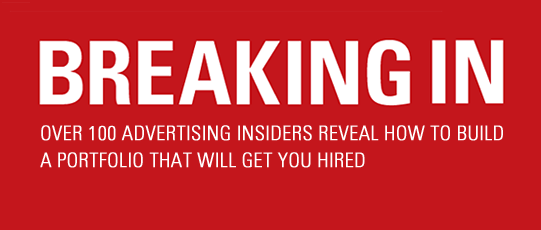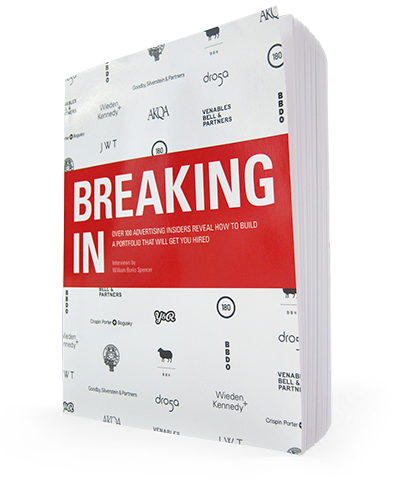In case you missed it, check out some great work from Brian Fraser.
WS: What do you look for in a student book? And what impresses you?
BF: Freshness. But that’s a bit broad, isn’t it? I think the most difficult thing about putting a book together is to put a book together that looks and feels and sounds different from other books. And that in itself is really hard. Because I think part of the problem is you’ve got—as it is now—you’ve got an advertising course. What tends to happen, particularly in this country, whether it be Watford or Hounslow or whatever, a lot of the students come out looking and feeling the same. So that’s kind of a downside to that course, I guess.
But it’s a point of view of freshness—a way of thinking about solving a problem in a lateral way, really, because that’s what we do. I mean, we get paid for solving problems as creatively as we possibly can. Ability to think across media platforms is a given, I guess, and it’s obvious. Even though, surprisingly, you still don’t see a huge amount of that in student books.
For me, I have a bugbear about a lot of student books. I just did a D&AD [Design & Art Direction, a British educational organization] workshop, which I haven’t done for about 10 years, but I thought it’d be interesting to see. Simon and I did one and about 26, 30 of them turned up—a great bunch of kids, very bright. Fantastic ideas. But I said, “Who’s the art director? Who’s a copywriter?” No one put their hands up. They did both roles. So I think if you want to make a difference putting a book together, to have some sort of cross skills is a huge advantage. Particularly some sort of art direction skills because what I see a lot of is the inability to be able to put things together. Having great ideas isn’t enough. If you can’t convert them, then they’re not great ideas, they’re bad ideas. So that’s worth thinking about when you put a book together.
I’m always going on to people in my department because they don’t get to the cinema enough. Don’t go to galleries enough. Don’t read enough. It’s all that sort of shit, you know, that you retain—those images, that information, those stories in your head. And it’s that ability to put them down on a piece of paper as opposed to just putting an idea down on a piece of paper. Really push it further. So I think a book with good ideas, and well executed, will show the ability that you’re thinking about how you could execute them. Or give you a good head start for what I’m seeing around.
[ … ]
WS: So the first thing you said was about making your book stand out. How do you do that?
BF: It doesn’t have to be ads. Advertising doesn’t have to live on a press ad or TV commercial. It equally doesn’t have to live online, either. It can live in lots of places. So demonstrate that. For example, you see a lot of books with really great one-off ideas. But the really difficult thing about what we do is to come up with big ideas. Big campaign thoughts that drill down into lots of different areas. That’s the real challenge. And if you can demonstrate you can do that, then you’re going to stand out.


Comments are closed.